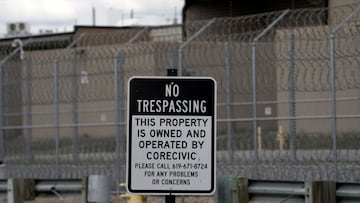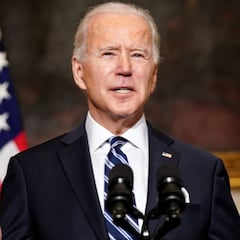What has Biden said about the use of private prisons?
President Joe Biden has signed four executive orders aimed at promoting "racial equity" in America, which reverses a Trump administration directive on privately-owned prisons.


On Tuesday President Joe Biden signed four executive orders aimed at tackling racial disparity in the United States, with one of the actions restricting the use of private prisons. The order directs the US Attorney General to not renew Department of Justice contracts with privately-owned prison facilities.
The order reads: “The Attorney General shall not renew Department of Justice contracts with privately operated criminal detention facilities, as consistent with applicable law.”
BREAKING: Biden is ordering his Department of Justice to end private prison contracts. This is huge.
— Public Citizen (@Public_Citizen) January 26, 2021
The use of private prisons is a controversial one which, although sometimes offering a cheaper alternative to publically-funded institutions, is said to incentivise mass incarceration. Upon signing the order, Biden described it as the “first step to stop corporations from profiting off of incarceration”.
What did Biden say about private prisons?
The new directive on the federal use of private prisons was just one part of a raft of executive orders aimed at furthering racial equity in the US. Studies have repeatedly shown that minority groups are more likely to find themselves incarcerated in America, while private prisons typically have higher rates of violent attacks and spend less on both prisoner welfare and staff pay.
"We have never fully lived up to the founding principles of this nation, to state the obvious, that all people are created equal and have a right to be treated equally throughout their lives," Biden said of the system which often places people of colour at a disadvantage. "And it's time to act now, not only because it’s the right thing to do. Because if we do, we'll all be better off."
No one should be profiteering off of our criminal justice system. That’s why today, I ordered the Department of Justice to end the use of private prisons by the federal government.
— President Biden (@POTUS) January 26, 2021
Biden also spoke specifically on the dangers of a privatised prison system in which companies make money off incarceration. The directive he issued on Tuesday only applies to those held in a federal facility, rather than state-ran prison, but he made clear that this is part of a broader process.
"This is the first step to stop corporations from profiting off of incarcerated - incarceration that is less humane and less safe, as the studies show. And it is just the beginning, in my view, to my administration's plan to address systemic problems in our criminal justice system.”
Biden reverses Trump decision with new executive order
The US’ first privately-owned prison, as we know it today, was introduced in Shelby County, Tennessee in 1984. The facility was ran by private company CoreCivic who, along with the GEO Group, are responsible for over half of all the private prison industry contracts in America.
Private companies now provide around 10% (roughly 14,000 of 150,000 inmates) of prison space for federal prisoners. In recent years their increasing role in the US prison system has been the subject of greater scrutiny and successive administrations have passed legislation to either curb or encourage their use.
In 2016, shortly before leaving office, President Barrack Obama signed an executive order to bring about the end of privately-owned federal prisoners. President Donald Trump then reversed the decision during his time in the White House and allowed the private companies to become increasingly entwined in the American prison system.
In the build up to the 2020 presidential election it was reported that both CoreCivic and GEO Group were donating large sums to Trump re-election campaign and to other Republican candidates.
Immigration detention centres not included in new order
Deconstructing the system of privatised incarceration was a pledge made by Biden in the run-up to the election and this is just one small part. The new directive only prevents new contracts for federal prisons being awarded to private companies, but does not include the growing network of privately-run immigration detention centres.
Good. Next should be ICE detention centers.
— Rep. Anna V. Eskamani 🔨 (@AnnaForFlorida) January 26, 2021
Research tells us that private prisons are less safe, increase time prisoners spend incarcerated, don’t reduce recidivism & cost as much or more than public prisons.
They only exist because government allows them to exist. https://t.co/lUkRpDPW8R
During his four years in office Trump oversaw the growth of Immigration and Customs Enforcement (ICE), the Department of Homeland Security agency that deals with border control. The Trump administration added over 17,000 beds to the US detention system, of which over 80% are housed in privately-run facilities.
Related stories
David Fathi, director of the American Civil Liberties Union’s National Prison Project, said that more needs to be done to reduce the influence of private companies on the US detention system.
“The order signed today is an important first step toward acknowledging the harm that has been caused and taking actions to repair it, but President Biden has an obligation to do more, especially given his history and promises.”

